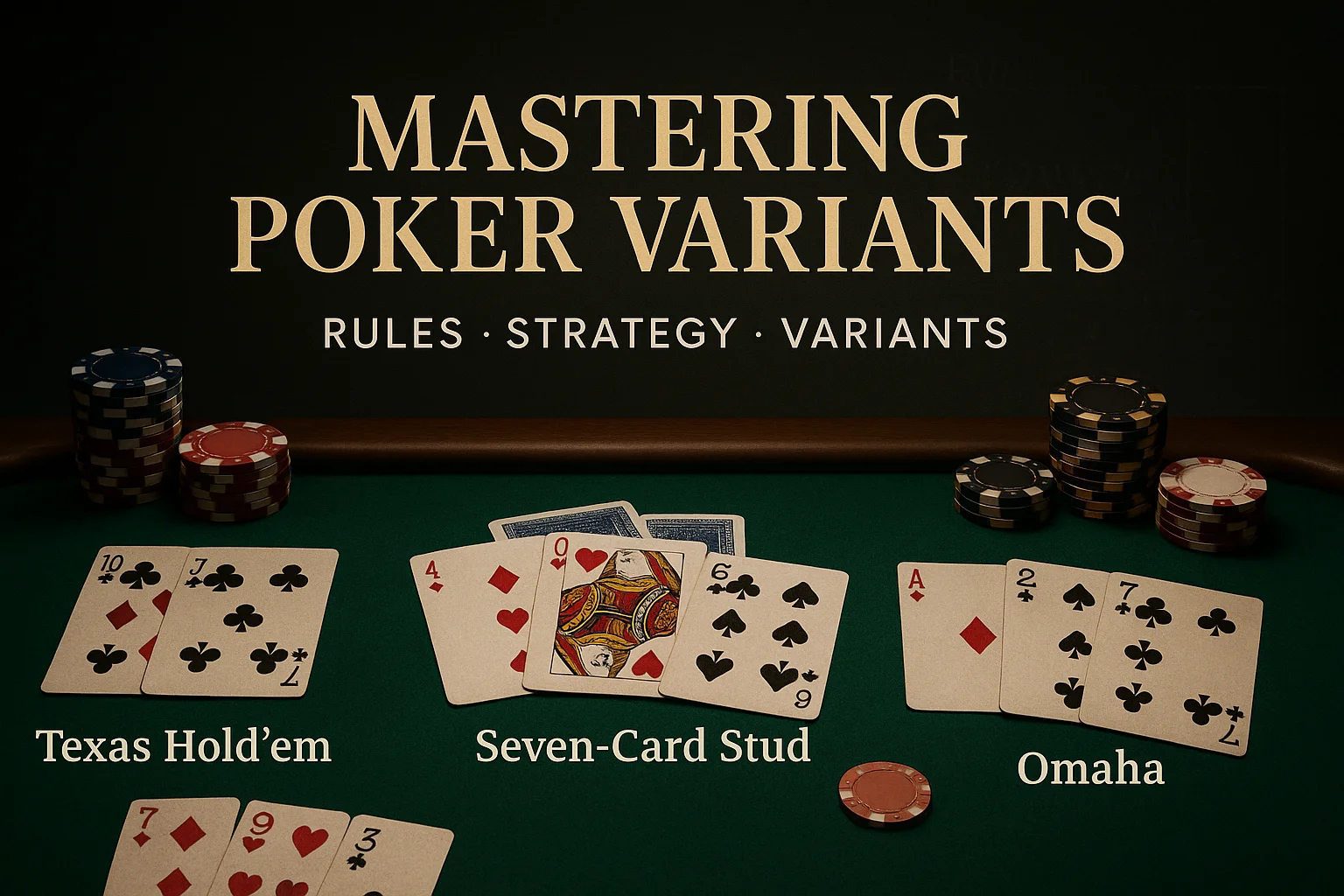
This poker variants guide learn rules will show why poker is one of the world’s most versatile card games, renowned for its mix of strategy, skill, and luck. While Texas Hold’em remains the most widely played variant, there are numerous other forms of poker that offer unique rules, strategic depth, and gameplay experiences.
Each variant, from Omaha and Seven-Card Stud to more niche games like Razz and Chinese Poker, brings something fresh to the table, catering to players with different preferences, skill levels, and playing styles. In this in-depth guide, we’ll explore the nuances, rules, and strategic approaches for popular poker variants, helping you choose the game that suits you best and giving you tips to succeed in each one.
And if you’re completely new to poker, be sure to learn how to start playing poker online with our beginner-friendly guide.
Texas Hold’em: The Game of Champions
Basic Rules and Structure
Texas Hold’em is played with each player receiving two private “hole” cards, while five community cards are dealt face-up in the center of the table. The objective is to make the best five-card hand using any combination of the hole cards and community cards.
The game has four betting rounds:
- Pre-Flop: The round begins after players receive their hole cards.
- Flop: The first three community cards are dealt, followed by a round of betting.
- Turn: The fourth community card is dealt, leading to another betting round.
- River: The final community card is revealed, with one last round of betting.
Key Texas Hold’em Strategies
- Starting Hands: Choose strong starting hands, like pairs or high-value connectors.
- Position Play: Playing from late position gives more control and information.
- Aggression and Control: Frequent raising helps you stay in control of the pot.
Why Texas Hold’em is Popular
Its balance of skill and luck, simple rules, and strategic possibilities make Texas Hold’em a global favorite. With huge tournament scenes like online and live poker tournaments, it continues to dominate the world of poker.
Omaha: High-Potential, High-Stakes Play
Types of Omaha
- Pot-Limit Omaha (PLO): Players can bet up to the size of the pot, leading to big hands.
- Omaha Hi-Lo (Omaha 8 or Better): Pot is split between the highest and lowest hand.
Key Omaha Strategies
- Focus on Draws and hands that have multiple ways to win.
- Play High-Value or Nut Hands to avoid being second best.
- In Hi-Lo, try to scoop both the high and low pot.
Why Choose Omaha?
Omaha is perfect for action-seekers who love high variance and deeper draw possibilities. It’s especially rewarding for players who enjoy aggressive play and calculated risk.
Seven-Card Stud: The Classic Poker Game
Basic Rules and Structure
In Seven-Card Stud, each player is dealt seven cards, three down and four up. There are no community cards. Betting rounds occur after each new card is dealt, from “Fourth Street” through “Seventh Street.”
Key Seven-Card Stud Strategies
- Only play hands that are likely to improve.
- Keep track of exposed cards to make informed decisions.
- Practice patience and fold weak hands early.
Why It Appeals to Strategic Players
This slower-paced game rewards memory, discipline, and reading skills. It’s favored by those who like thoughtful, methodical play rather than fast action.
Razz: The Anti-Poker Game
Basic Rules
Razz flips traditional poker upside down: the lowest five-card hand wins. A-2-3-4-5 is the best hand. Played like Stud, players receive seven cards and bet through five rounds.
Key Razz Strategies
- Only play starting hands with three low cards (preferably under 8).
- Fold high hands early, don’t chase with weak cards.
- Track opponents’ up cards to assess their potential strength.
Why Play Razz?
Razz is ideal for players who enjoy mental games and Stud-style play with a twist. If you’re looking for something different, it’s a great way to improve reading skills and patience.
Five-Card Draw: Simple but Strategic
Basic Rules
Each player receives five private cards. After a round of betting, players can discard and draw new cards. A final round of betting follows before showdown.
Key Strategies
- Play premium hands like high pairs or flush draws.
- Use bluffing smartly since hands are hidden.
- Watch how many cards your opponents draw, it gives away clues.
Want to level up your game? Check out the full NLHE vs PLO Strategy Guide
Why It’s a Classic
Five-Card Draw is great for casual games and new players. It’s simple to learn, fun to play, and great for mastering bluffing techniques.
Other Exciting Poker Variants
- Pineapple & Crazy Pineapple: Players receive three hole cards, discard one post-flop.
- Badugi: A four-card lowball game with no pairs and all different suits.
- Chinese Poker: Arrange 13 cards into three hands with a point-based scoring system.
- HORSE Poker: A mix of Hold’em, Omaha Hi-Lo, Razz, Stud, and Stud Hi-Lo.
- Short Deck Hold’em: Deck uses 36 cards (2–5 removed) for faster action.
Choosing Your Poker Variant
The poker variant you choose depends on your goals, risk appetite, and playing style. Here’s a cheat sheet:
- Beginners: Try Texas Hold’em or Five-Card Draw.
- Thrill Seekers: Go for Pot-Limit Omaha.
- Strategists: Dive into Seven-Card Stud or Razz.
- Variety Lovers: Try mixed games like HORSE.
Poker’s diversity is its greatest strength. From the fast-paced play of Hold’em to the calculated decisions of Stud, there’s a game out there for everyone. Don’t forget to check out our online poker club reviews to find the best sites for your preferred variant.
Want more expert poker breakdowns and guides? Explore more at Bluffing Monkeys.
